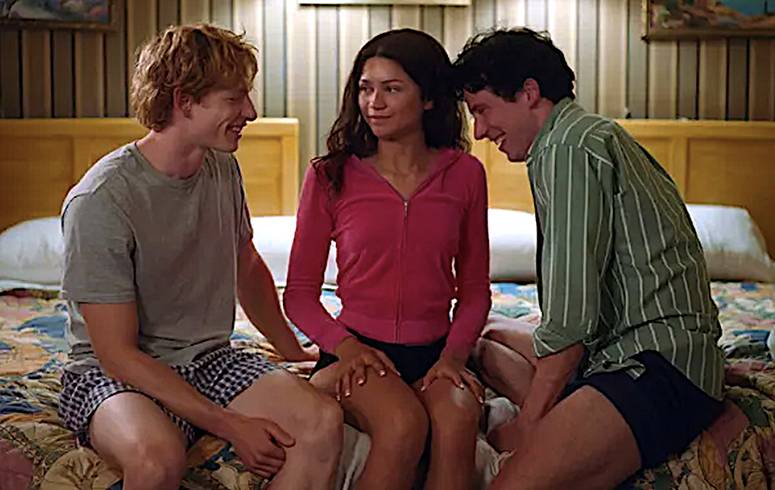Zendaya’s slick ménage à tease
Challengers, Luca Guadagnino’s latest, is designed a bit like a Fabergé egg with a mechanical timepiece concealed inside: you can see all the parts moving in luxurious precision, and it’s pretty much the looking on in awe that matters.
Guadagnino is no stranger to luxurious trappings, from I Am Love to the louche rock star world of A Bigger Splash to sun-drenched Italy in Call Me By Your Name. Here, he places us in the middle of a pro tennis romance set in luxe suites, Hampstead estates and gorgeously lit hotel lobbies. Zendaya is at the center of it all, playing Tashi Duncan, a driven yet slyly composed tennis star on the rise, shepherding two young competitive bucks, Patrick and Art (Josh O’Connor, Mike Faist), through a ménage à tease. But that is in the past, as the story zips from scene to scene in non-linear fashion. Challengers is rightly noted for its embrace of screen eroticism—straight, gay, questioning—but the story, if told in a conventional manner, would probably lack the velocity of a 120 mph serve. Instead, driven by pumping electronic beats from Trent Reznor and Atticus Ross, the narrative whips our heads back and forth in time, releasing information, drawing us in like we’re watching a final match (which, indeed, the movie frames isaelf around). It’s as much about the sleek surfaces of young bodies as it is the trajectory of tennis balls.

O’Connor (from The Crown) and Faist (from West Side Story) are convincingly eager as competing boarding school lads whom Zendaya cons into sitting with her on a grubby motel bed, licking her neck, and joining her in a three-way kiss, before slyly withdrawing and watching them in amusement as they slobber over one another. These are two “types,” Patrick being the reckless one who “coasts by on his talent,” with no plan to get ahead in the pros; Art being the dutiful grind who follows every bit of advice Tashi gives him. Guess which one she ends up with?
If Dune and Spider-Man didn’t make Zendaya a major star, Challengers should. It’s designed to highlight her command of the camera, and it does. But the script, by Justin Kuritzkes, is much smarter than your average rom-com love triangle jaunt. It may rely too much on the tennis/love metaphor, but it’s a joy to watch unfold. Zendaya’s turn here reminds me of Jennifer Lopez’s breakout role in Out of Sight, Steven Soderbergh’s 1998 heist film that also relied on non-linear narrative and an element of danger. There’s even a scene set in an after-hours hotel bar, with the elements of a storm whipping around outside. But it’s mostly in the intelligence both Zendaya and J.Lo radiate in those movies: a woman weighing all her options, sizing up the angles, picking her shots.


